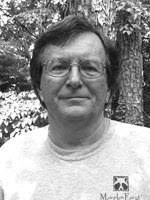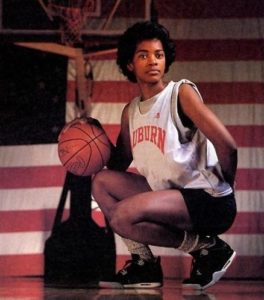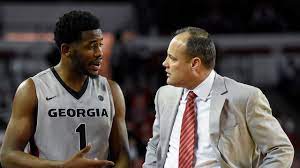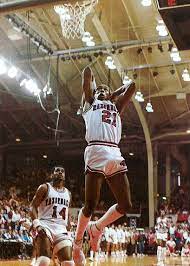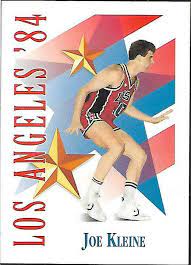The NBA Finals date back to 1947 (when they were known as the Basketball Association of America Finals) and the very 1st NCAA tourney was held in 1939. Olympic basketball competition is even older: it debuted as a demonstration event in 1904 and the men’s version became a medal sport in 1936, with the women finally getting their chance to go for the gold in 1976. The United States has dominated Olympic basketball competition from the start: the men have won 16 gold medals in the 19 tournaments they have participated in during the past 85 years, while the women have won 9 gold medals in the 11 tournaments in which they have competed during the past 45 years. HoopsHD’s Jon Teitel continues his coverage by chatting with Jim Sumner (columnist for Go Duke: The Magazine and Duke Basketball Report) about Tate Armstrong being a great shooter and winning a gold medal.
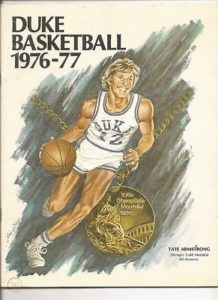 (photo credit: worthpoint.com)
(photo credit: worthpoint.com)
Armstrong was born in Georgia and went to high school in Texas: what made him choose Duke? I am unsure if he was heavily recruited. He was a 6-2 center in high school and was also a ball boy for the Houston Rockets. Jack Marin played for Houston at the time and they shot around before games. Duke coach Bucky Waters had helped recruit Marin to Duke when Waters was an assistant, and Marin later recommended Armstrong to Duke. Ironically, Waters never got to coach Armstrong.
He played for Coach Neill McGeachy as a freshman: why did the Blue Devils hire Bill E. Foster to replace him in 1974, and what impact did it have on the team? Waters had a five-year contract and entering his final year he asked Duke AD Carl James for an extension. James declined and Waters resigned days before the beginning of practice. McGeachy was Waters’ top assistant and James did not really have any other options. McGeachy was given one year to prove his worthiness. His team went 10-16, which set a school record for losses. By accounts, McGeachy’s players loved him, but 10-16 is, well, 10-16. Foster came in and installed an up-tempo offense, both to bring back a dwindling fan base and attract recruits, and this played to Armstrong’s strengths.
After averaging 9.7 PPG/1.7 APG as a sophomore he averaged 24.2 PPG/4.4 APG as a junior: how was he able to improve so much in the course of just 1 year? Two reasons. One, he was healthy. Two, he was in better shape. Foster told him he wanted him to be in better shape for 1976 so Armstrong went home to Texas and ran 10-15 miles every day…in Houston…in the summer.
In 1976 he was named 1st-team All-ACC and 1st-team All-ACC tourney: what did it mean to him to receive such outstanding honors? I am sure that he was pleased but I am also sure that he wanted more wins. He told me once that it was agonizing to score so many points in so many losses, but it was Duke’s best chance to win games.
He won a gold medal with team USA at the 1976 Olympics: what did it mean to him to represent his country, and what did it mean to him to win a gold medal? I am sure that he was pleased but I suspect he wishes that he could have played more.
In his senior year the team started 10-1 before losing 12 of their final 16 games to finish 14-13: how good could that 1977 roster (including 4 future NBA players in Armstrong/Mark Crow/Mike Gminski/Jim Spanarkel) have been had Armstrong not been limited to only 14 games due to a right wrist injury he suffered during an 8-PT OT win at Virginia that January? This is one of the great what-ifs in Duke history. A maximum of two teams from any one conference could go to the NCAA Tournament in those days and North Carolina was going to get one of those two spots. Duke almost certainly would have had to win the ACC Tournament to go to the NCAA Tournament. I doubt whether they had the depth to do that but an NIT bid was very doable, and after a six-year run of mediocrity even an NIT bid would have been a major step in the right direction. A final note on that season: Armstrong’s last game was that win at Virginia, which ended a five-year-ACC road losing streak for Duke. Armstrong scored 33 points and played the entire second half and overtime with a broken right wrist…and he was right-handed. He finished the game despite a broken wrist that hurt tremendously with every shot/dribble.
He finished his college career with 51.9 FG%/80.4 FT%: what was his secret for being such a great shooter? Are great shooters born or made? Yes. In other words, he came to Duke with potential and worked very hard to maximize that potential. As a senior he beat Washington and Richmond on buzzer-beaters so everyone knew that he could shoot in the clutch.
In the summer of 1977 he was drafted 13th overall by Chicago (5 spots behind Jack Sikma): did he see that as a validation of his college career, or the realization of a lifelong dream of reaching the NBA, or other? From my conversations with Tate, I think his NBA memories are bittersweet. He was hurt a lot and played at a time when drug use and marital infidelity were issues that bothered him…a lot.
He played 2 years with the Bulls and after retiring he became a real estate developer in the DC area and had 7 children: how did his Duke education prepare for life off the court? Well, his wife was a Duke cheerleader when they met, so he probably would cite that! He was a somewhat famous ex-athlete with a degree from an academically elite and well-known university. Combine that with the kind of work ethic that made him a standout basketball player and one can connect the dots pretty easily.
When people look back on his career, how do you think that he should be remembered the most? It is hard to say. He was really only healthy for about a season and a half, never played in the NCAA Tournament or NIT, and never played past the first round of the ACC Tournament. That magical 1978 Duke season basically overshadowed anything Duke had done in the almost decade since Vic Bubas left coaching, but when Tate was healthy he was one of the great shooters/scorers in Duke history. Only Dick Groat (twice), Art Heyman (thrice), Bob Verga, and JJ Redick have ever averaged more points for Duke in a season then the 24.22 Armstrong averaged in 1976. He is probably best remembered as someone who should be better remembered.

